Best secure email provider of 2025
A secure email provider can deliver privacy and protection – but which one is best?
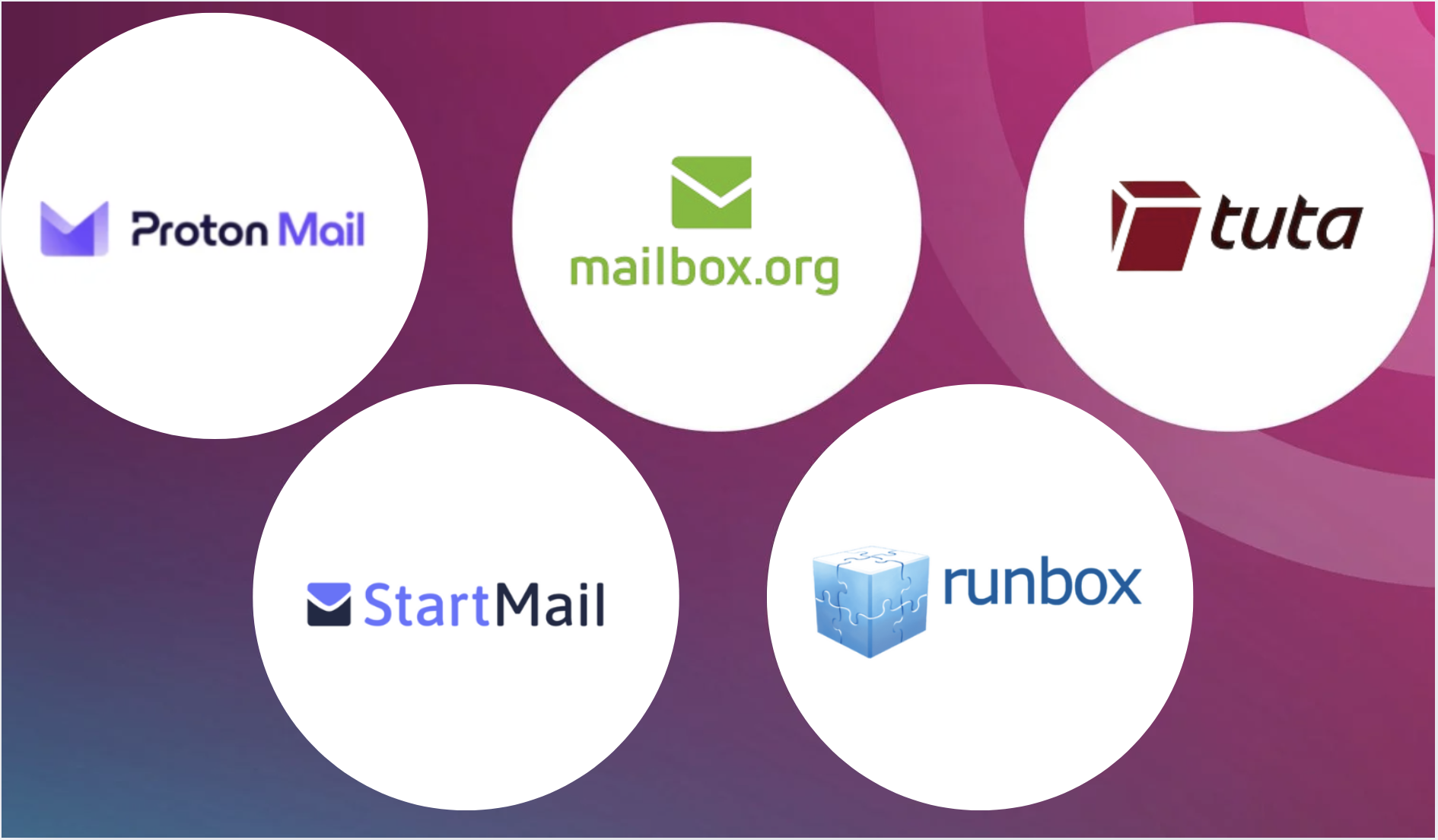
If you want to ensure maximum privacy and security for your communication, then it’s best to spend some time doing your research on the best secure email provider - because if you’re working with sensitive information, you can’t be too careful.
With cyberattacks on the rise and more of our information than ever held online, it’s all the more important to make sure you’re protected.
That’s why we’ve thoroughly tested the privacy, security, and usability of the best secure email providers available. We’ve also examined their pricing, features, and capabilities for enterprises. You’ll be able to find out which secure email provider is best for you, whether you’re investing for yourself, your family, or your business.
With different types of encryption on the market, like OpenPGP, alongside a huge range of extra features like VPNs and cloud storage modules, there’s lots to consider.
With all that in mind, here are the most secure email providers currently on the market.
Best overall
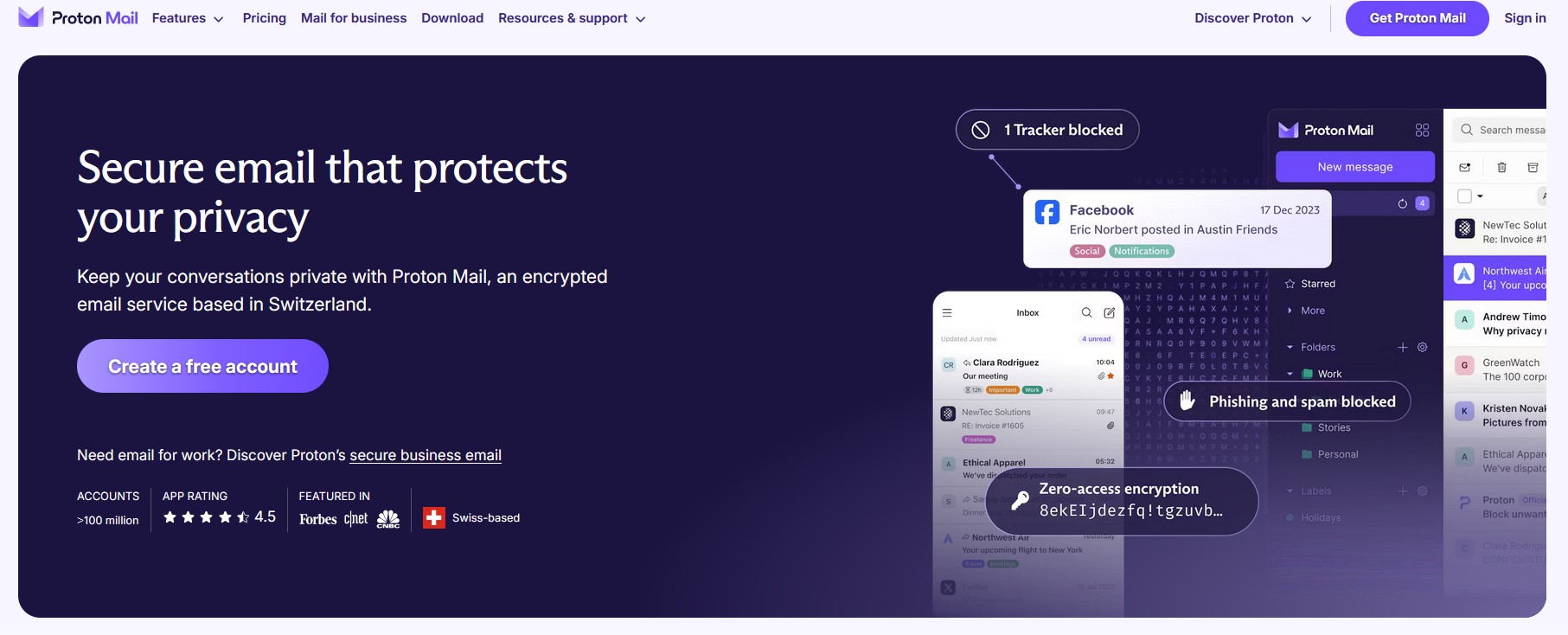
Reasons to buy
Reasons to avoid
Features
Why you can trust TechRadar
Proton is packed with features. End-to-end TLS encryption ensures that no third party can access your emails, including Proton themselves, and messages to non-Proton users can be password-protected. If you receive emails from non-Proton users, they’re encrypted using TLS and re-encrypted with zero-access encryption for storage on Proton’s servers.
Proton also offers auto-deletion, spy pixel blocking and tracking protection. However, be aware that subject lines aren’t protected by the same level of encryption thanks to Proton’s reliance on TLS and OpenPGP.
Beyond email, Proton offers a cloud storage module with version histories and a basic document editor, a VPN for private browsing, and a calendar. Some product tiers add a password manager. Its apps cover Android and iOS, and the SimpleLogin browser extension lets you use anonymous email addresses when you sign up for online services.
Proton's web client, encryption, and apps are also mostly open-source. The downsides are minimal, including a weaker search function and a sign-up process that sometimes requires phone or email verification.
Plans and pricing
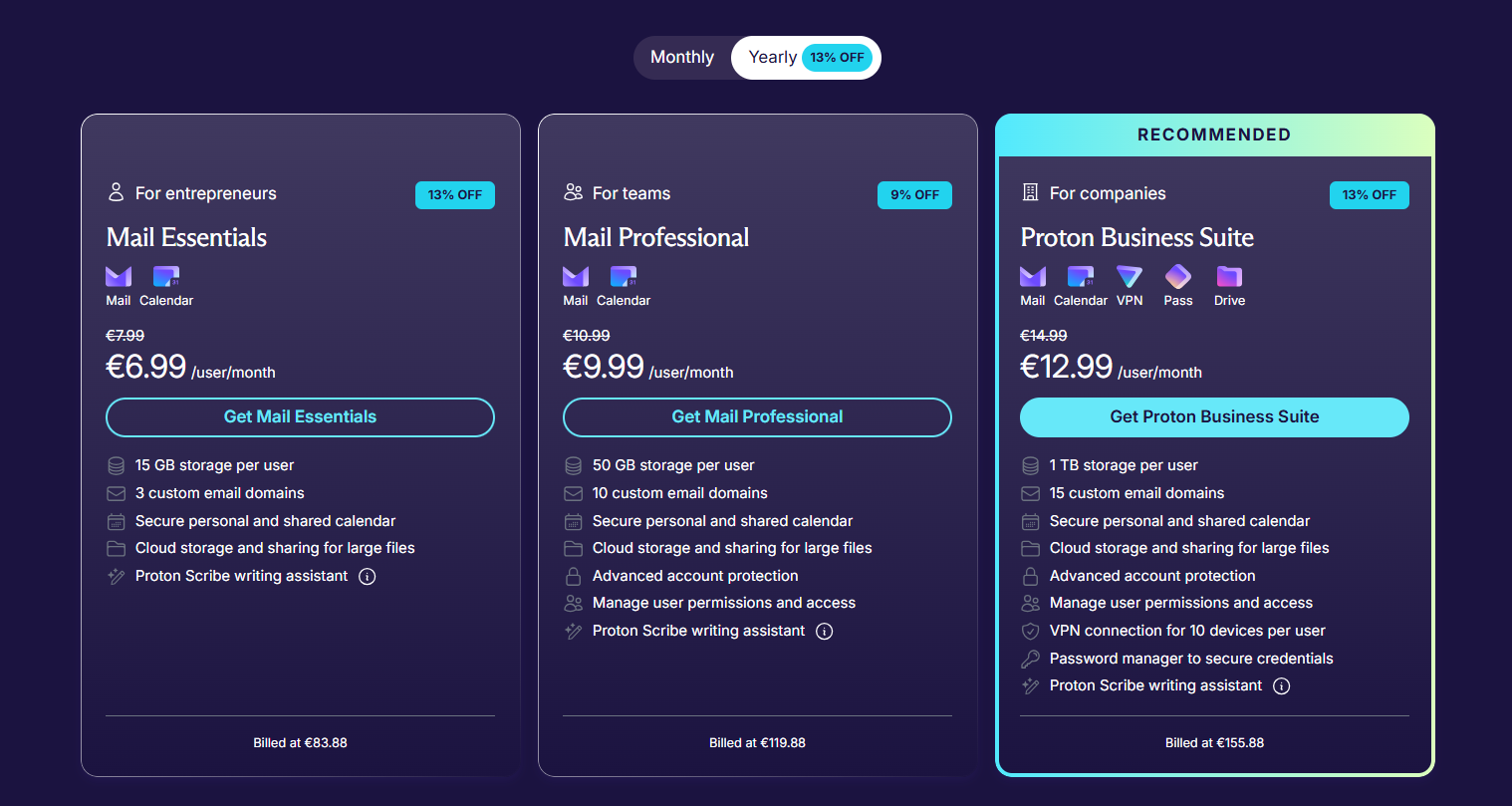
Impressively, you can use Proton Mail with a free account with end-to-end encryption, although only for one email address with 1GB of storage.
Mail Plus costs $3.99/£3.29 per month and provides individuals with ten aliases, support for one custom domain, ten hidden addresses, and 15GB storage. The $9.99/£8.19 Proton Unlimited plan delivers a whopping 500GB storage, more custom domain support, and extra features, like access to Proton’s VPN, cloud storage, and password manager.
Then there’s the Proton Duo account, which costs £14.99/£12.29 for two users and adds all the previous functionality alongside the Proton Scribe writing assistant.
A family account for $23.99/£18.44 per month allows up to six users and 3TB of storage.
Businesses can sign up for Essentials, Professional and Business Suite accounts, which cost $6.99/£6.99, $9.99/£9.99 or $12.99/£12.99 per month and add progressive levels of functionality in line with those individual packages.
Interface and in-use
Proton uses a classic two- or three-pane interface system. You can click the top of the window to open other modules and choose between different visual themes.
In addition to browser access and Android and iOS apps, Proton also offers a downloadable desktop client that integrates Proton with apps like Microsoft Outlook or Apple Mail.
Verdict
Proton Mail is one of the best secure email products available. Its robust encryption is backed up by several legal victories and a privacy-focused Swiss business.
Beyond secure email, Proton impresses with its VPN, password management, and cloud storage modules. It’s not the cheapest, but if you want secure email with extras, it's one of the best options.
Best for green energy
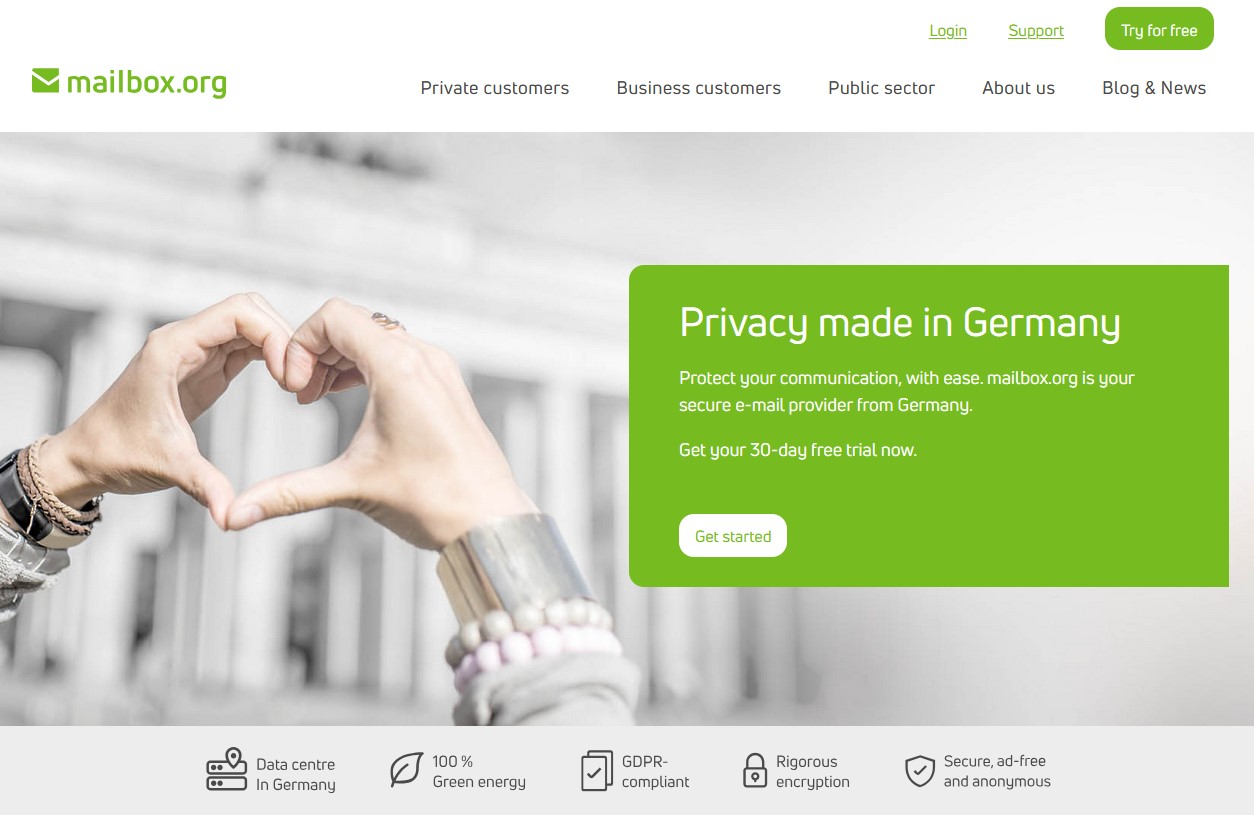
Reasons to buy
Reasons to avoid
Features
Mailbox.org uses 100% green energy and is privately funded without debt, so it's a good choice if you want a secure email provider that won’t be interfered with by outside investors.
Mailbox.org also offers excellent encryption. It’s got built-in PGP encryption and its own PGP key server, a TLS checker is integrated into the webmailer, and security certificates come from DigiCert.
HSTS, CSS, CSP and more mechanisms protect data in transit, and the service also uses PFS and DNSEC.
Users can deploy alias addresses, two-factor authentication and robust spam protection to improve security further, and outgoing mail has its metadata and IP addresses removed.
This strong level of protection extends to Mailbox.org’s cloud storage module, and beyond browser-based access you can also use Android and iOS apps to access Mailbox.org’s services.
Remarkably, Mailbox.org also offers reasonable word processing and spreadsheet tools, a task planner, a calendar, and even a secure video conferencing tool.
Frustrations are minimal. While there are Android and iOS apps for cloud storage, there are no apps for Mailbox.org’s email, office or video conferencing modules. The service isn’t entirely open-source, and subject lines aren’t always fully encrypted.
Plans and pricing
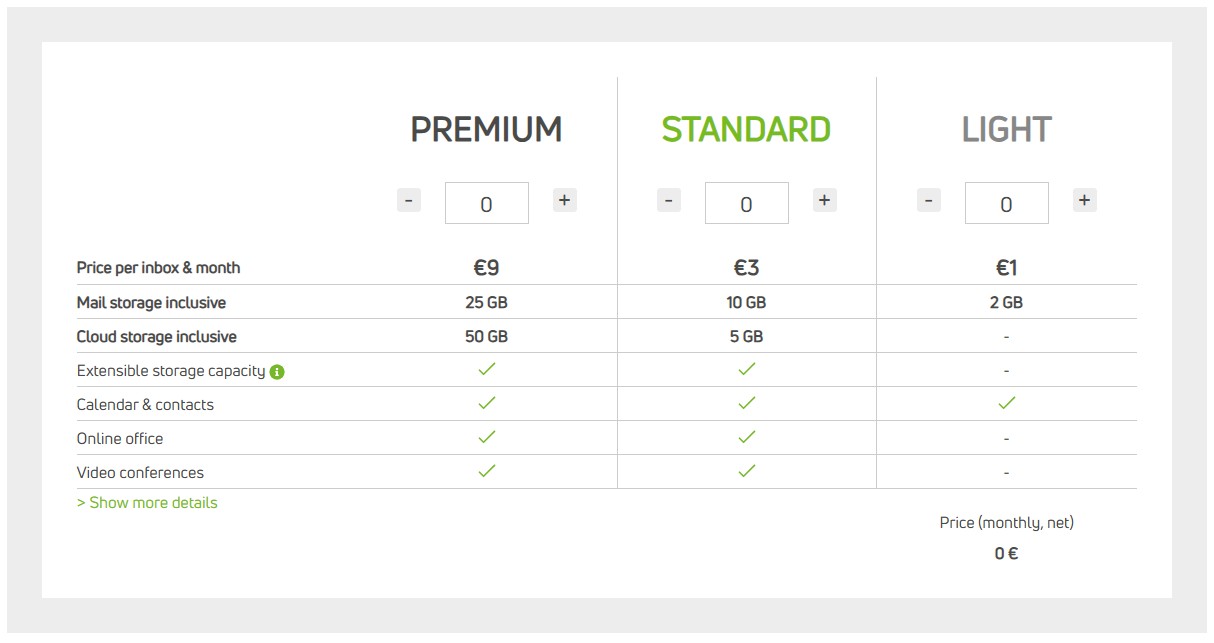
Mailbox.org offers no free option, but it’s not expensive to get started: the Light plan costs just €1/$1/£1 per month with 2GB of storage alongside calendar and contact functionality, but no cloud storage, office tools or video conferencing and limited support.
The Standard plan costs €3/$3/£3, beefing up the offering with more storage and office and conferencing functionality. The Premium plan costs €9/$9/£9 per month and includes 25GB of email space and 50GB of cloud storage alongside priority support and more compliance.
Business customers can choose from similar tiers and pick between support packages that provide differing levels of service.
Interface and in-use
Mailbox.org’s email functionality with POP3, IMAC and ActiveSync clients and in browsers, and Android and iOS apps are available for its cloud storage.
A slick portal allows access to Mailbox.org’s many modules, the sleek three-pane interface is easy to use, and the whole thing can be customized with different layouts and colors.
Verdict
Mailbox.org is an excellent secure email product and the ideal secure email provider for anyone who wants to use green energy.
It’s secure, well-designed and easy to use, it’s got lots of features, and it’s cheaper than many of its rivals. The lack of a mobile app and VPN are galling when compared to products like Proton, but that’s it. If you want renewable energy, stick with Mailbox.org.
Best for free users
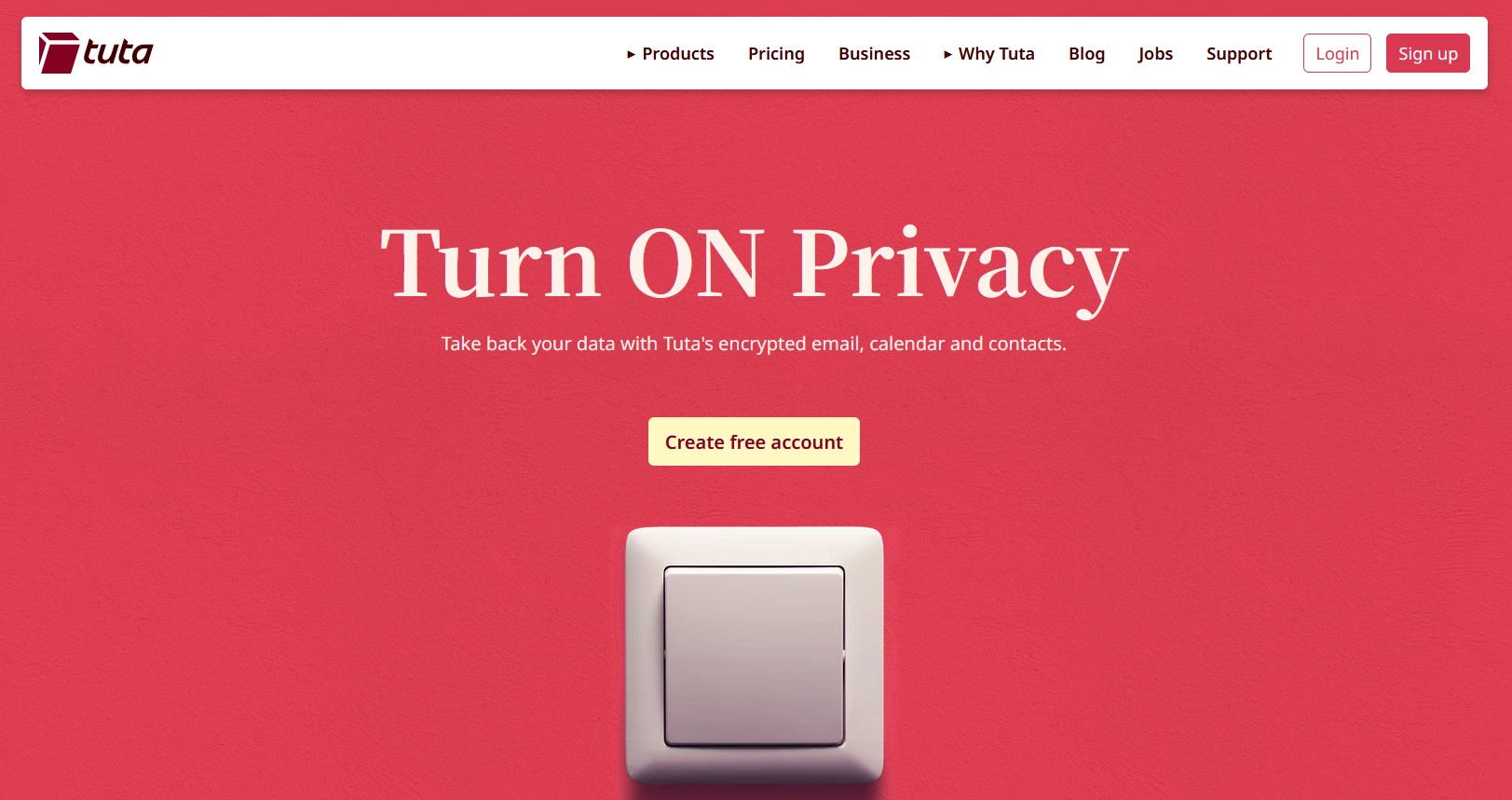
Reasons to buy
Reasons to avoid
Features
Tuta’s zero-knowledge architecture uses AES 256 and AES 256/RSA 2048 symmetric and asymmetric encryption with TLS – some of the best email security you’ll find anywhere. Tuta is even the first email provider to deploy quantum-safe algorithms to protect against attacks launched from quantum computers.
Beyond excellent end-to-end encryption that protects contents, subject lines, attachments, IP addresses, and more, Tuta’s GDPR-compliant service is open source. It offers desktop and web clients as well as Android and iOS apps.
Two-factor authentication is supported, and the sign-up process is genuinely anonymous. Tuta publishes regular transparency reports and has its security audited by independent experts. The organization also uses 100% clean energy.
Unusually in this field, though, Tuta does not support IMAP, SMPT, or POP3 because it cannot guarantee the safety of emails retrieved using those protocols. Also, remember that Tuta doesn’t offer extras like a VPN, password manager, cloud storage module, or office suite, and some accounts must wait 48 hours for authorization after sign-up.
Plans and pricing
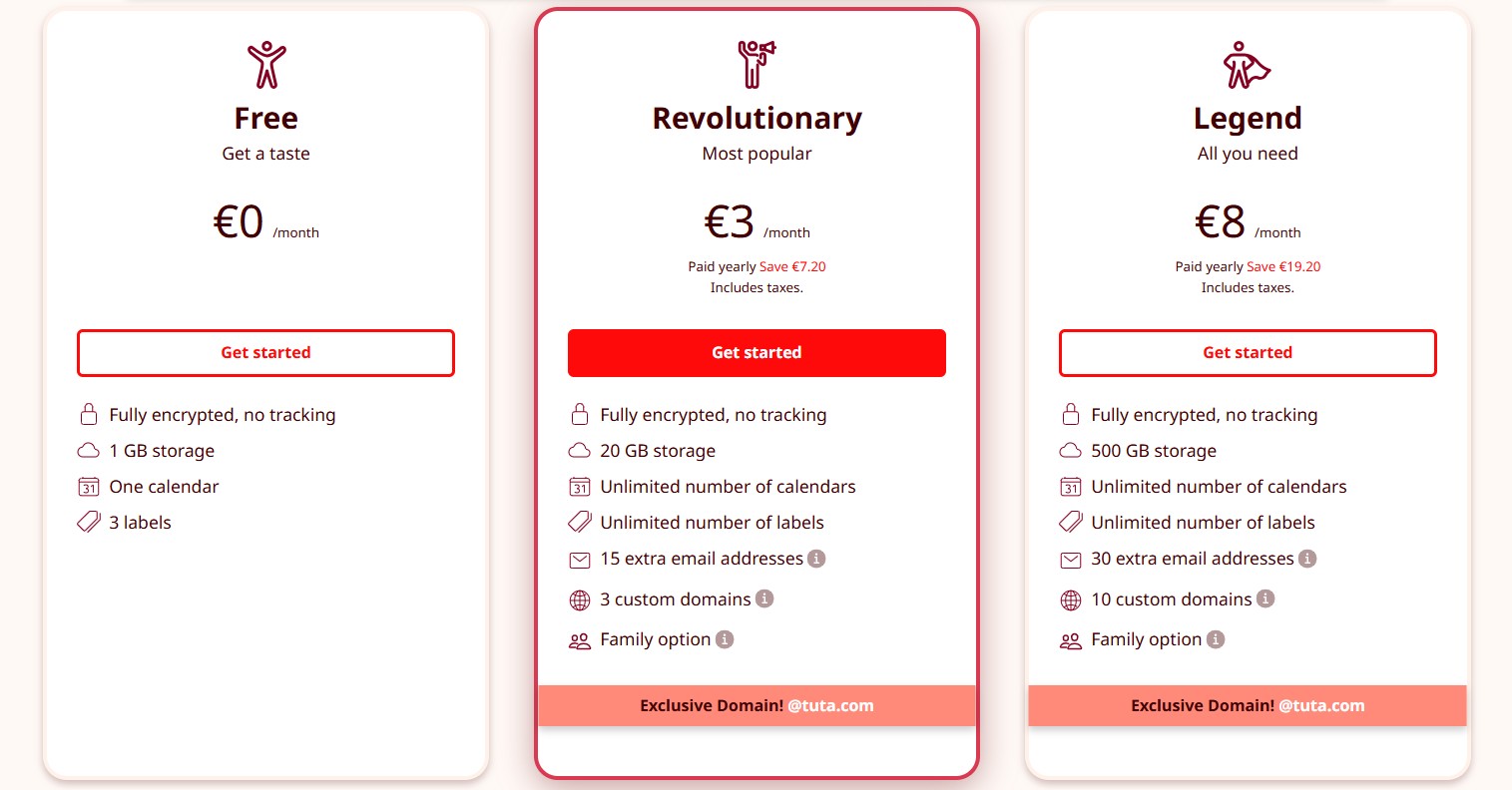
Tuta’s free account is a great option for anyone who wants secure email without spending money. It offers full access to Tuta’s fantastic security and 1GB of storage.
Tuta’s Revolutionary plan costs €3/$3.15/£2.52 and includes 20GB of storage, fifteen email addresses, three custom domains, and a family option. The €8/$8.40/£6.73 Legend tier delivers 500GB of storage, 30 email addresses, ten custom domains, and priority support.
There are business options, too, with Essential, Advanced and Unlimited products costing €6, €8 and €12 per user per month with varying levels of storage, addresses and support.
Interface and in-use
ILike most rivals, Tuta uses a traditional three-pane interface, with extra links on the left-hand side to settings and support and a fantastic search function. And whether you’re on desktop or mobile, the interface is similarly effective and uncluttered.
Tuta’s desktop client functions just as well, and you can find the iOS app on the Apple app store. The only wrinkle here is the Android app – it’s not available on Google Play, so you need to download and install the AFK directly or use the F-Droid repository.
Verdict
Tuta delivers exceptional security and privacy to its users, even at the free tier, and it’s easy to use – which makes it our top choice if you need a free, secure email provider.
The tricky Android app, potential 48-hour authorization and lack of extra features are minor issues, but you’ll have to pay elsewhere to solve those problems. If you need free, secure email, Tuta is your best bet.
Best alternative for privacy
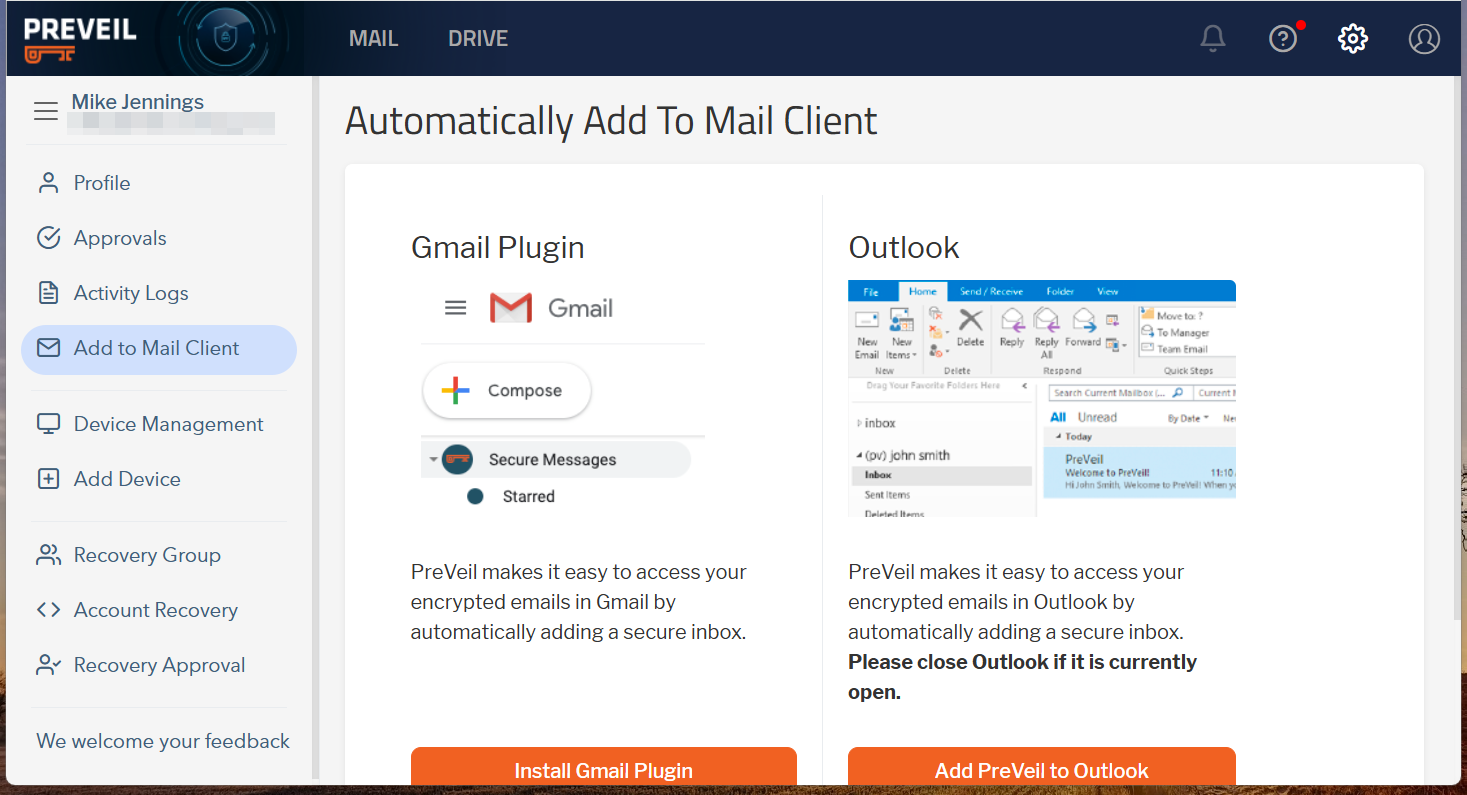
Reasons to buy
Reasons to avoid
Features
PreVeil works using a web client or its own Android and iOS app, but it also works with your existing Outlook, Gmail or Apple clients, too – an immediately versatile start.
PreVeil operates using Zero Knowledge encryption with end-to-end ability, which means that all information is only encrypted and decrypted on user devices. Underneath, you’ll find robust AES-256 for symmetric encryption and elliptic curve P-256 for asymmetric keys.
Passwords aren’t used with PreVeil, either – instead, account access is managed by secret encryption keys based on Public Key Infrastructure technology that are only stored on user devices. No PGP-based encryption is used with PreVeil.
We’ve got no qualms about PreVeil’s security, and it’s impressive elsewhere. Its ability to work with email clients and free Android and iOS apps means that you can access your encrypted emails from anywhere.
Approval Groups cryptographically distribute trust to predetermined groups of users to avoid individuals compromising entire networks, and Trusted Communities allow organizations to safelist domains and email addresses.
It’s not just about email, either, because PreVeil includes secure cloud storage and a broad range of settings and management features for administrators.
Plans and pricing
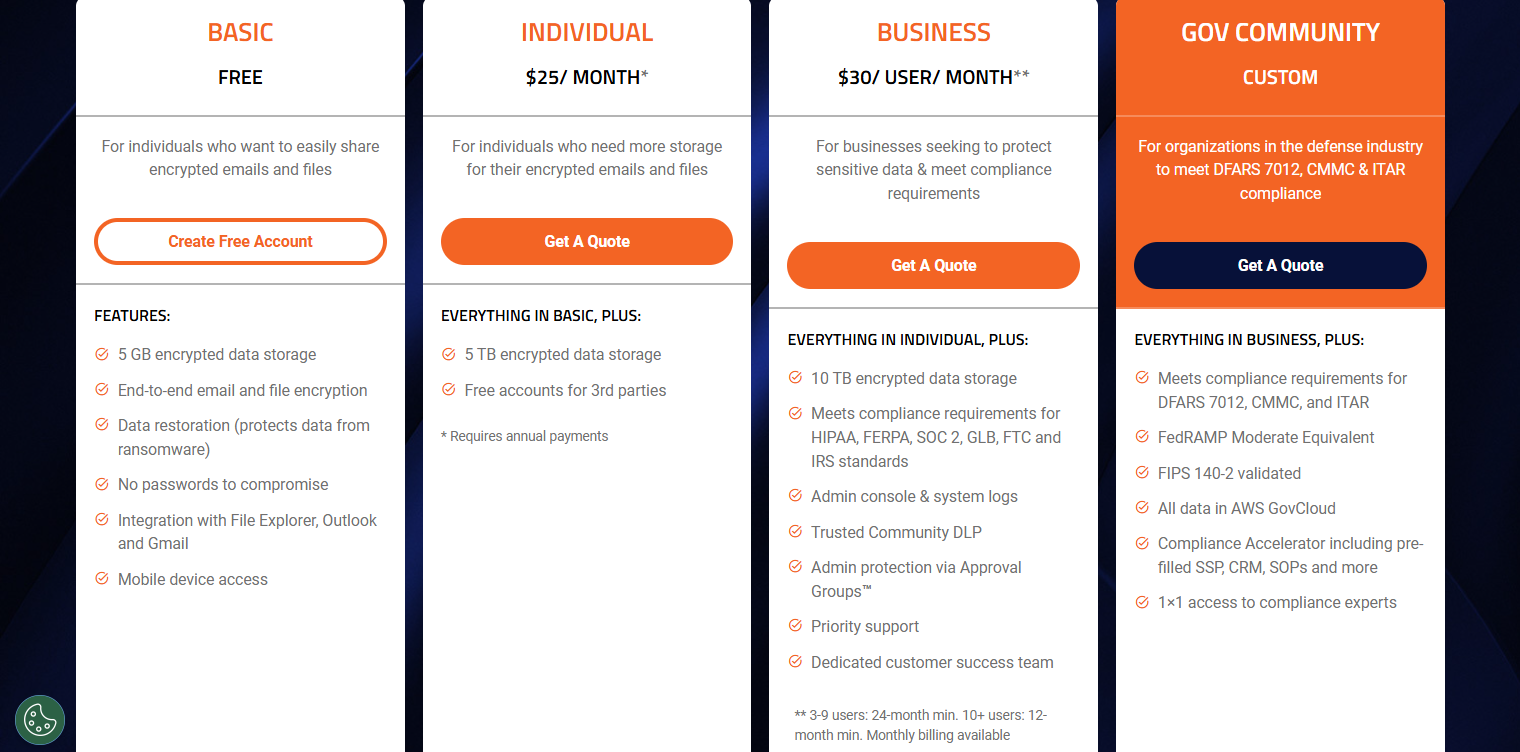
PreVeil offers a good free account that delivers 5GB of storage alongside integration with Outlook, Gmail, and File Explorer.
The Individual plan costs $25/£20 per month, which is more expensive than most other individual plans – but, in PreVeil’s defence, that package comes with a mammoth 5TB of data storage.
The Business product costs $30/£24 per user per month and meets compliance requirements for HIPAA, FERPA, SOC 2, GLB, FTC, and IRS standards. It includes an admin console, system logs, admin protection, data loss prevention, and access priority support.
If you work for a government organization or in the defence industry, PreVeil offers a product that meets DFARS 7012, CMMC, and ITAR requirements and is FIPS 140-2 validated.
In this final tier, you get FedRAMP Moderate Equivalent, all data is stored in the AWS GovCloud, and you enjoy a Compliance Accelerator with pre-filled forms and compliance experts.
On top of this, SMEs can use PreVeil Pass, which is a CMMC compliance solution that costs $415 per month for three users and includes encrypted email, pre-filled CMMC documentation and specialist support.
Interface and in-use
PreVeil’s browser interface and mobile apps are straightforward, well-designed, and not overloaded with complicated settings. However, they don’t support a three-pane interface.
To use PreVeil with your existing email client, you’ll need to go through a cryptographic setup process. Once that’s done, PreVeil adds a Secure Messages folder to your email app, and a toggle allows you to activate or remove PreVeil encryption from your messages.
Verdict
PreVeil competes well with every other secure email provider we’ve mentioned. It offers compliance for various industries, its security credentials impress, and it offers a free product.
It’s versatile too, thanks to its ability to work with existing email clients. Bear in mind, though, that PreVeil is pricier than many other products, and it’s overkill unless you need its compliance abilities and high-end features.
Best for enterprise
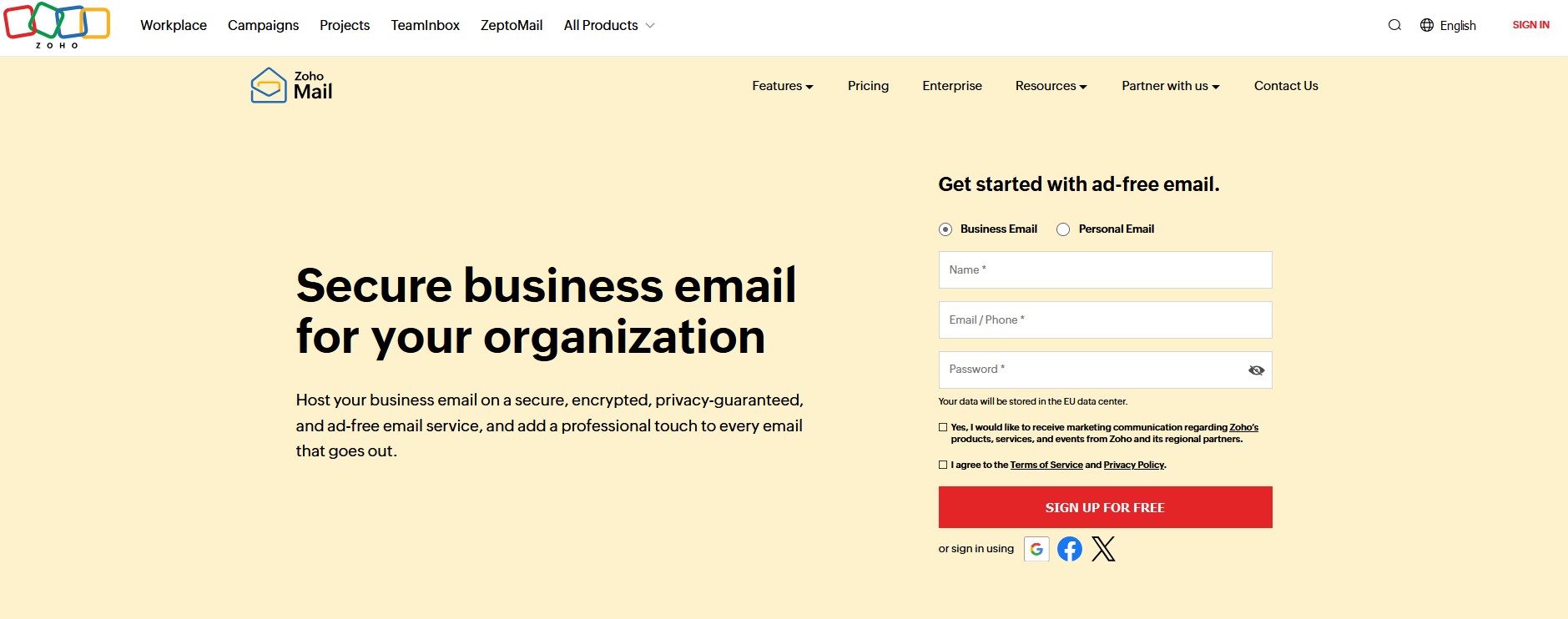
Reasons to buy
Reasons to avoid
Features
Because Zoho Mail is part of a larger business with a comprehensive array of enterprise products, it has a wide range of integrations with other enterprise tools, from a CRM platform and accounting software to cloud services and employee management.
Zoho is GDPR and HIPAA compliant, which is a good start for any secure email product, and Zoho Mail has ISO 22301, 9001 and 27001 certifications.
SSL/TLS connections encrypt emails in transit, S/MIME is used to encrypt message contents, and PGP adds another layer of protection.
Elsewhere, Zoho supports OAuth 2.0 two-factor authentication and single sign-on, and Zoho monitors your accounts for unusual activity.
This product supports custom domains, POP, IMAP and ActiveSync and it’s available with Windows, Mac and Linux clients – that latter option is scarce among secure email providers. On mobile, there are apps available for Android and iOS.
There are loads of other features that make Zoho a useful corporate option, too. Offline inboxes and automatic sending are supported alongside templates. There’s a new AI assistant called Zia – which could raise concerns about privacy for certain users – and Zoho offers a contact list, to-do list, and office tools at higher payment tiers.
The system also integrates with the Zoho family, which means it works with hundreds of options. However, Google, Microsoft, Adobe, and Apple have fewer integrations.
Plans and pricing
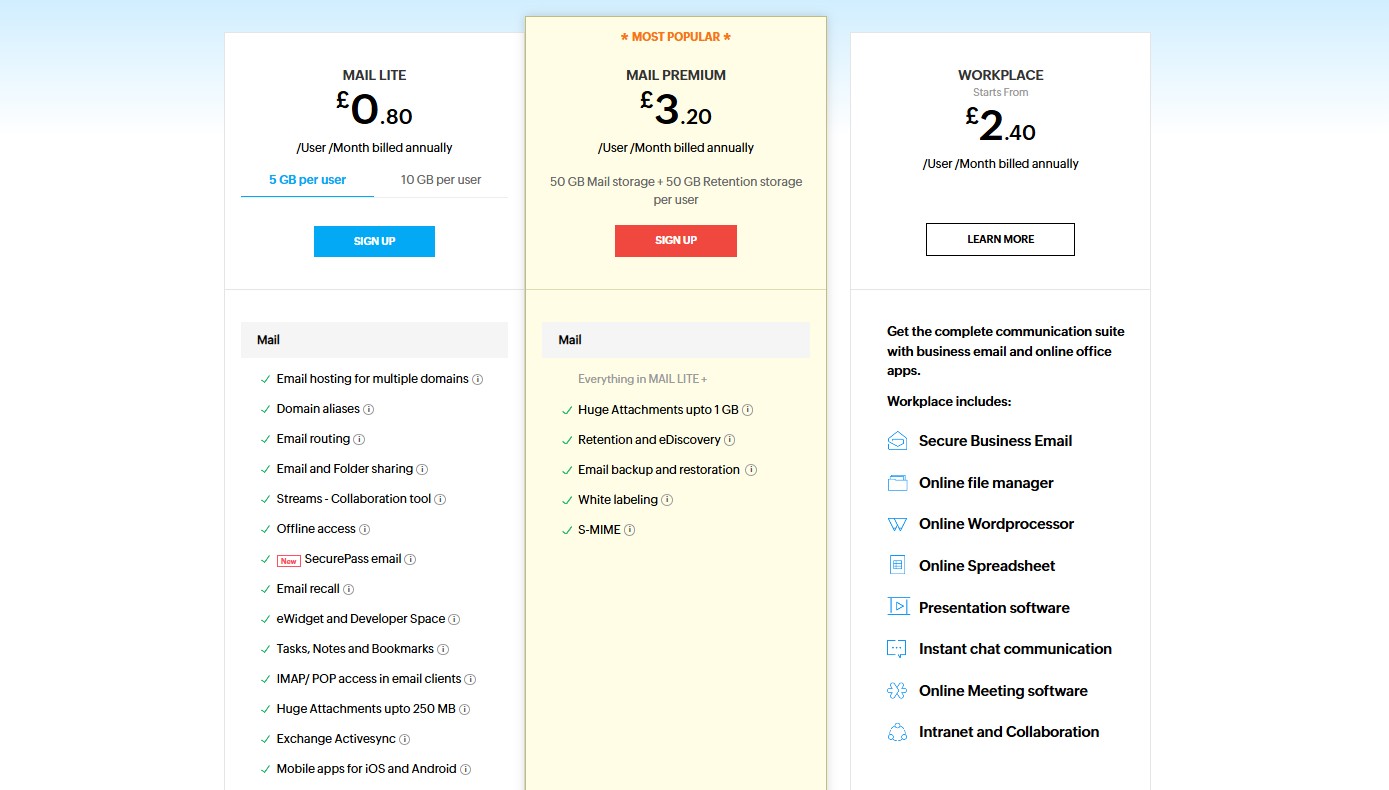
Zoho’s pricing gets off to a surprising start: a free product is available. The plan is generous, supporting up to five users, each with 5GB of space and a 25MB attachment limit. You can use web access and Android and iOS apps, but it doesn’t include IMAP, POP, or ActiveSync support.
The most affordable paid plan, Mail Lite, costs €0.90/$0.94/£0.80 per user per month and includes Zoho’s standard business email capability alongside tools like SecurePass password-protected mail, IMAP, POP and ActiveSync support and a calendar.
The Mail Premium option costs €3.60/$3.74/£3.20 per month per user. It takes the Mail Lite package and adds 1GB attachments, retention, email backup and more.
The Workplace package costs €2.70/$2.81/£2.40 per user per month and its price increases as you add features – it’s designed specifically for larger organizations and is more akin to a fully-fledged work suite from Google or Microsoft. And if you need an enterprise-level deal, it’s best to contact Zoho directly.
Interface and in-use
Zoho Mail has an excellent interface. Its three-pane design is weighted toward the contents of your emails, and a toolbar on the left edge provides access to other modules. You can record audio messages and add security when composing emails, and a useful tab on the right provides access to your Zoho integrations.
Visually it’s attractive, with light and dark modes that sync to your main computer. You can change themes and colors, customize your fonts, and dive into hundreds of settings.
Verdict
Zoho is a very secure and effective email product, and it pairs that with great features and design. The pricing is decent, too, although it’s worth remembering that Zoho will be at its best if you’re already a user within the Zoho ecosystem.
If you’re an individual then it’s best to look elsewhere – Zoho is overkill. And if you’re not already a Zoho user, consider options from rivals to see if they’re better for your organization.
Quick overview
Email Provider Name: | Proton Mail | Mailbox.org | Tuta | PreVeil | Zoho |
|---|---|---|---|---|---|
Encryption | PGP + TLS | PGP + TLS | Hybrid AES + RSA + TLS | End-to-end + TLS | PGP + TLS |
Jurisdiction | Switzerland | Germany (14 Eyes) | Germany (14 Eyes) | USA (Five Eyes) | USA (Five Eyes) |
Open Source | Yes | Yes (except backend infrastructure) | Yes (Client apps only) | No (some open-source cryptography) | No |
Custom domains | Yes (Plus Plan) | Yes (Standard plan) | Yes (Revolutionary Plan) | Yes (Individual plan) | Yes (Mail Lite plan) |
Aliases | Yes (paid) | Yes (paid) | Yes (paid) | Yes (paid) | Yes (paid) |
Mail client support | Yes | Yes (IMAP, POP3, ActiveSync) | No | Yes (IMAP, POP3, ActiveSync) | Yes (IMAP, POP3, ActiveSync) |
Security audit | Yes (2023, Cure53) | Yes (2022, BSI) | Apparently, but not published | Yes (2019, SOC 2 Type 1) | Yes (2024, SOC 2 Type 1 + HIPAA) |
Accepts crypto payments | Yes (BTC only) | No | No, but Monero gift cards and ProxyStore payments supported | No | No |
Pricing (lowest) | Free (1GB max storage) | $1 | Free (1 GB max storage) | Free (5 GB max storage) | Free (5 GB max storage) |
We've also listed the best free email services.
Best secure email provider FAQs
Which email provider is the most secure in 2025?
Proton Mail and Tuta are some of the most secure email providers in 2025. Proton Mail comes with zero-access encryption i.e. all email and attachments remain fully encrypted on their servers. This prevents any third parties or even the provider from accessing your files and conversations.
Similarly, Tuta operates under the strict privacy laws of Germany and offers post-quantum cryptography to future-proof its encryption against various threats posed by quantum computing. Both of these platforms come with a free plan offering limited storage and some useful features.
What is a secure email provider?
A secure email provider offers privacy and security to your emails with enhanced protection against unauthorized access, data breaches, and countless cyberattacks. Such providers are generally end-to-end encrypted and adhere to strict privacy standards, such as GDPR compliance.
These platforms are ideal for individuals, businesses, and organizations who want strong privacy like journalists, activists, and professionals dealing with sensitive data. However, keep in mind that the protection is sometimes limited to email content, meaning any attachments and external communication might require additional encryption tools.
Why is encryption important in email services?
Email services should encrypt their user's data to protect any sensitive information shared online via email. The protection helps you guard against different cyber threads like man-in-the-middle (MITM) attacks, phishing, and data breaches.
As a business, it helps you adhere to legal and industry standards such as GDPR, HIPAA, or CCPA. And, even when your emails are intercepted or stored in a compromised server, such platforms help your content remain unreadable as it requires a decryption key to unlock.
How we test
To determine the best secure email providers, I focused on these key criteria:
- End-to-end encryption: only the sender and recipient can read emails
- Data privacy and jurisdiction: providers based in countries with strong privacy laws
- Multi-factor authentication (MFA): to add an extra layer of security against unauthorized access
- Additional security features: providers with features like self-destructing emails, secure link confirmation, and encrypted file storage rank higher for comprehensive protection
- Usability and reliability: secure services that balance strong security with ease of use, ensuring that users can implement advanced features without hassle
Get in touch
- Want to find out about commercial or marketing opportunities? Click here
- Out of date info, errors, complaints or broken links? Give us a nudge
- Got a suggestion for a product or service provider? Message us directly
Sign up to the TechRadar Pro newsletter to get all the top news, opinion, features and guidance your business needs to succeed!

Benedict has been writing about security issues for over 7 years, first focusing on geopolitics and international relations while at the University of Buckingham. During this time he studied BA Politics with Journalism, for which he received a second-class honours (upper division), then continuing his studies at a postgraduate level, achieving a distinction in MA Security, Intelligence and Diplomacy. Upon joining TechRadar Pro as a Staff Writer, Benedict transitioned his focus towards cybersecurity, exploring state-sponsored threat actors, malware, social engineering, and national security. Benedict is also an expert on B2B security products, including firewalls, antivirus, endpoint security, and password management.